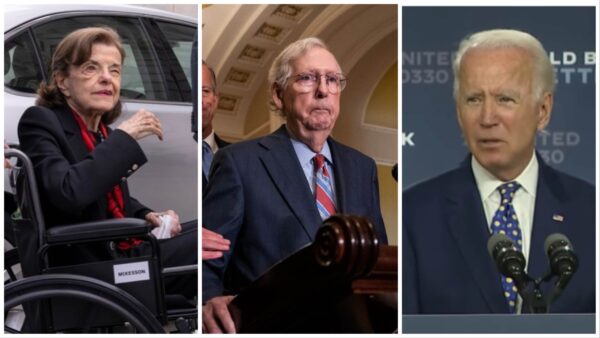Following yet another bizarre freezing episode that the public witnessed Senate Minority Leader Mitch McConnell experience this week and the rising number of reports surrounding health scares for other elderly elected officials, people are starting to demand term limits and even age limits for those in public office.
During a press conference in Kentucky on Wednesday, a reporter asked the 81-year-old about his reelection plans. Instead of responding, he just stood stock-still on camera. Even after his aides interceded to check on McConnell and ask if he heard the question, he remained frozen. This is McConnell’s second freezing episode in just over a month.

In July, he froze during a news conference at the Capitol as he was discussing an annual defense policy bill. After he suddenly stopped speaking mid-sentence, his colleagues approached him at the podium to ask if he was OK. When he didn’t respond, he was escorted away before returning a short time later to resume the conference.
It’s been widely reported that McConnell suffered a couple of falls this year. A fall in March left him with a concussion and a fractured rib, but after a six-week leave, he returned to work in April. Even after this second freezing incident, his doctor “medically cleared” him to continue his work schedule.
However, the short time between both episodes is leaving many in doubt about McConnell’s abilities to continue his in-office duties.
This goes for other politicians like Sen. Dianne Feinstein and even President Joe Biden, whose ages and health matters have also made headlines and renewed questions about whether they’re up to fulfilling their responsibilities.
“It’s time for most of them to go,” wrote one social media user.
Biden is the oldest president in history, turning 81 this November. Sen. Feinstein just turned 90 over the summer. Even Donald Trump, the leading and embattled GOP presidential contender, is 77.
Biden’s health has become a source of worry for many voters in his time as president. His frequent gaffes and stutters during various remarks and press conferences often garner feelings of unease. Doctors from his annual examination this year said he’s in “good health” despite minor health issues with osteoarthritis and acid reflux. His neurological exam also came out clean.
A recent NBC News poll revealed that 68 percent are concerned that the president does not possess the “necessary” mental and physical health to serve. Approximately 55 percent report they have “major” concerns. If Biden is re-elected in 2024, he’d be 86 by the time his second term ended.
Feinstein has also drawn much attention this year due to her lengthy recovery from the shingles virus. Her absence from office caused her to miss 91 votes and stalled the nominations of several judicial nominees. She’s served as a U.S. Senator for California for more than 30 years after being first elected in 1992.
McConnell was first elected to the Senate in 1984, so he’s been in office for nearly 40 years now.
According to the Pew Research Center, in 2022, the median age in the U.S. House of Representatives was 57.9 and 65.3 in the Senate. This current 118th Congress is actually one of the oldest in history.
You won’t find many elected positions that come with term limits outside the executive branch and a few federal agencies. Judicial appointments and congressional seats at the federal level don’t have term limits.
As NPR reports, one of the chief reasons for the lack of turnover in federal politics stems from polarization and the power behind being an incumbent politician. That’s according to one historian the outlet spoke with.
“These long-serving members are pretty safe,” he said. “In terms of primary elections, it’s very hard to defeat an incumbent,” Alan Lichtman, a historian and professor at American University in Washington, D.C., told NPR.
Current officeholders are re-elected time and time again, in part because parties seldom challenge their own members in primaries. In fact, 98 percent of incumbent lawmakers were re-elected in 2022. And as competitive seats dwindle, so does the ability to unseat a sitting lawmaker.
Other advantages of being an incumbent politician include access to big donor bases, established relationships in Washington, and experience.


